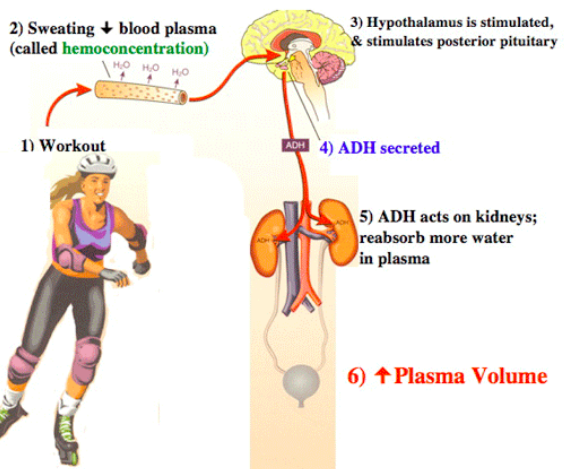1
Question
How is the amount of urine produced regulated?
How is the amount of urine produced regulated?
Open in App
Solution
Urine:
- Urine is made up of water, urea, minerals, and pigments in our bodies.
- The volume of urine generated is highly influenced by the amount of extra water or reabsorbed water, even in the body's dissolved waste.
- When there is an overabundance of water in the body, a large amount of dilute urine is expelled.
- When there is no excess water, a tiny amount of condensed pee is expelled.
- More water is predicted to be expelled in areas of the body where the amount of dissolved trash is higher.
- As a result, the amount of urine produced is growing.
- The amount of urine produced is also affected by the antidiuretic hormone (ADH) and the body's environment.
- Urine generation in human bodies is generally accomplished through three processes: glomerular filtration, reabsorption, and secretion.
ADH and Blood volume regulate urine production :
- When blood volume decreases, the pituitary glands release antidiuretic hormone (ADH).
- ADH operates on the nephron's distal convoluted tubules, enhancing water reuptake from the kidneys.
- As a result, the overall volume of urine generated will be reduced.
- Urine output is also affected by blood volume.
- When blood volume drops too low, it induces greater water reuptake in the distal convoluted tubules.
- When blood pressure rises owing to increased blood volume, the amount of water filtered out in the glomerulus rises as well.
- As a result, ADH and blood volume modulation both play a role in regulating the volume of urine generated.

Urine:
- Urine is made up of water, urea, minerals, and pigments in our bodies.
- The volume of urine generated is highly influenced by the amount of extra water or reabsorbed water, even in the body's dissolved waste.
- When there is an overabundance of water in the body, a large amount of dilute urine is expelled.
- When there is no excess water, a tiny amount of condensed pee is expelled.
- More water is predicted to be expelled in areas of the body where the amount of dissolved trash is higher.
- As a result, the amount of urine produced is growing.
- The amount of urine produced is also affected by the antidiuretic hormone (ADH) and the body's environment.
- Urine generation in human bodies is generally accomplished through three processes: glomerular filtration, reabsorption, and secretion.
ADH and Blood volume regulate urine production :
- When blood volume decreases, the pituitary glands release antidiuretic hormone (ADH).
- ADH operates on the nephron's distal convoluted tubules, enhancing water reuptake from the kidneys.
- As a result, the overall volume of urine generated will be reduced.
- Urine output is also affected by blood volume.
- When blood volume drops too low, it induces greater water reuptake in the distal convoluted tubules.
- When blood pressure rises owing to increased blood volume, the amount of water filtered out in the glomerulus rises as well.
- As a result, ADH and blood volume modulation both play a role in regulating the volume of urine generated.

Suggest Corrections
7
View More
Join BYJU'S Learning Program
Join BYJU'S Learning Program
